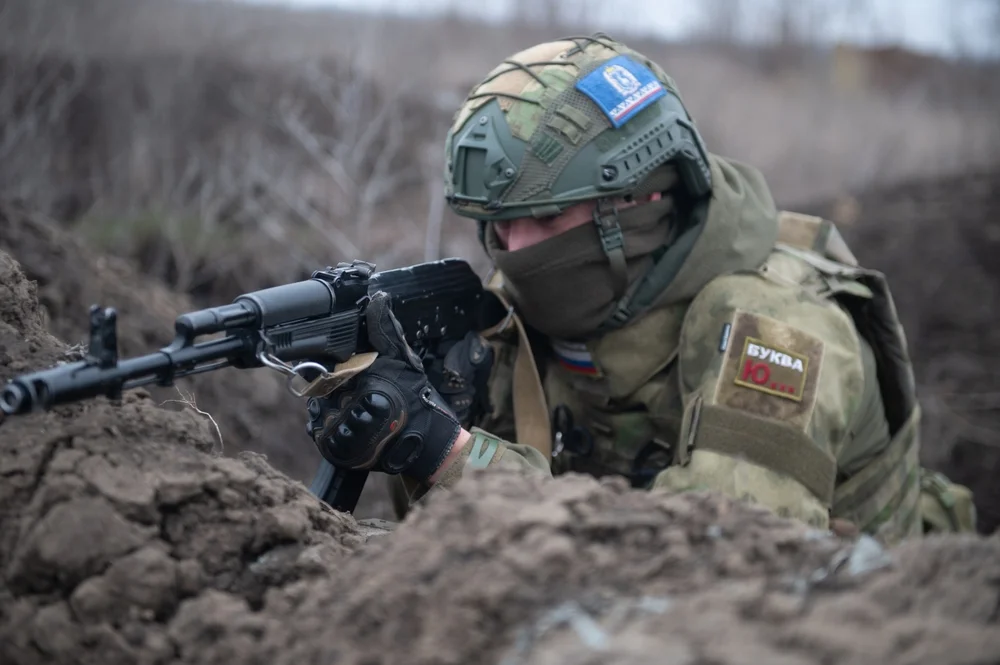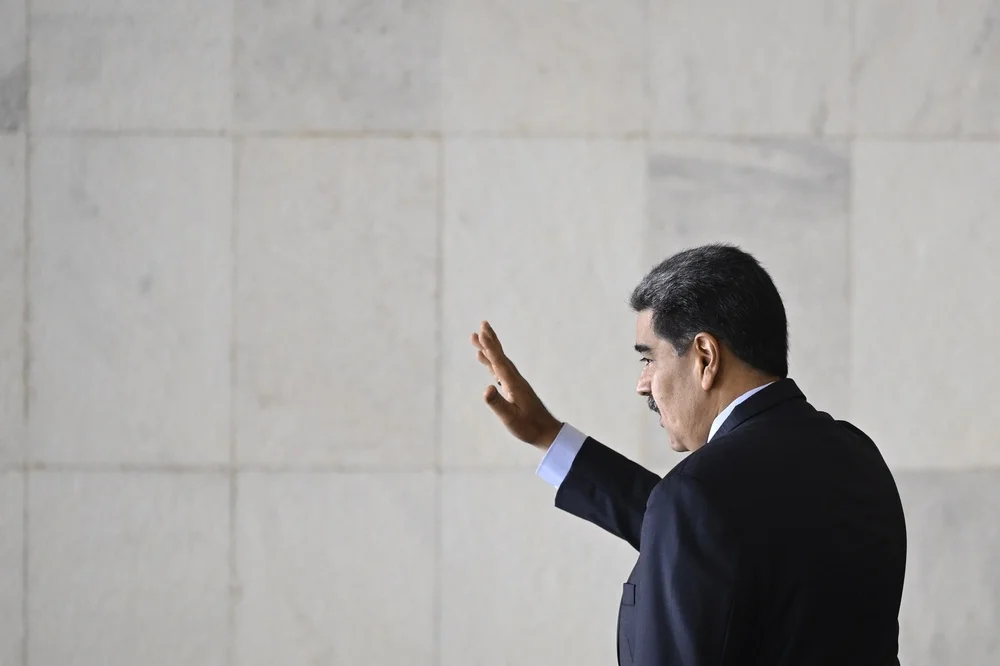
How Trump Should Answer Putin’s Foot-Dragging
The harsh reality is that whatever deal may emerge from Trump’s peace talks, it’s unlikely to resolve the fundamental question at stake in this war.
Despite President Donald Trump’s efforts to broker peace in Ukraine, Russian bombs continue to fall. Trump seems to be growing frustrated but has yet to apply tangible pressure on the Kremlin. That needs to change. Washington should work with its allies and Ukraine to tighten the economic screws on Moscow and exhaust the Russian military’s offensive potential.
Putin’s Ambitions and U.S. Interests in Ukraine
Putin’s ambitions extend beyond seizing some additional Ukrainian territory. Despite having failed to install a puppet regime in Kyiv, the Russian autocrat remains determined to make Ukraine a vassal state and to rewrite Europe’s security architecture.
America has important interests in checking Russia’s imperialistic ambitions. Ensuring Ukraine remains independent, democratic, and well-armed prevents Russia from expanding the frontage across which it can threaten NATO. Instead, Moscow must account for a capable Ukrainian adversary on its flank during a potential attack on the alliance. U.S. security assistance for Kyiv, equivalent to less than 3 percent of Pentagon spending in 2022-2024, has helped weaken America’s second-biggest adversary. It also signals resolve to other enemies, such as China.
The harsh reality is that whatever deal may emerge from Trump’s peace talks, it’s unlikely to resolve the fundamental question at stake in this war. A follow-on invasion will remain a strong possibility. A good agreement, however, can maximize Ukraine’s chances at a secure and prosperous future. A bad one would only encourage further aggression by Moscow and other authoritarian regimes.
Russia’s Maximalist Demands
Russia has been dragging out peace talks while pursuing more territory and greater negotiating leverage via military means. Although Ukrainian President Volodymyr Zelenskyy has repeatedly said he’s ready for an immediate, unconditional ceasefire, Putin has demurred, demanding a halt to Western arms supplies to Ukraine.
In mid-April, Washington presented a peace framework to European and Ukrainian officials, threatening to walk away from negotiations absent significant progress. Elements of the framework caused consternation in Kyiv, particularly a proposal for formal U.S. recognition of Moscow’s illegal annexation of Crimea. Yet it also falls well short of what the Kremlin wants.
In an April 28 interview, Russian Foreign Minister Sergei Lavrov doubled down on Moscow’s hardline demands. In addition to abandoning its NATO aspirations, Ukraine must accept “demilitarization and de-Nazification,” including by repealing laws aimed at countering Russian influence, Lavrov declared. Moscow also sees “international recognition” of all the illegally annexed territories as “imperative,” along with sanctions relief, the return of frozen assets, and the withdrawal of international arrest warrants on Russian officials. Lastly, Moscow seeks restrictions on Western military activity near Russia, Lavrov said.
Putin might still accept some version of Washington’s framework. Although he won’t abandon his goal of dominating Ukraine, Putin could calculate that agreeing to end the fighting, at least for now, would allow him to pocket concessions, normalize relations with Trump’s America, and destabilize Ukraine internally as Zelenskyy faces backlash over an unpopular deal.
On the other hand, Trump’s threat to withdraw from the peace talks could perversely encourage Kremlin intransigence if Putin decides Trump can’t deliver an acceptable deal: Moscow may bet that Trump would halt aid for Ukraine and eventually agree to normalize relations anyway.
Squeezing Russia’s Economy
Instead of walking away, Trump should get tough. He has repeatedly threatened to punish Russia economically if it remains recalcitrant, but these threats grow less credible each time he doesn’t deliver. A shot across the bow could help convince Putin to compromise. Even if Moscow still rejects a ceasefire, tougher sanctions might at least shorten the time Russia’s struggling economy can sustain the war.
Slashing Russia’s energy export revenue, the backbone of its federal budget, is key. Washington should aggressively sanction the entities and vessels facilitating Russian oil exports outside the G7 price-cap mechanism. Blacklisting the rest of Russia’s so-called “shadow fleet” should be a top priority. Meanwhile, Washington should work with allies to lower the G7 price caps as close as possible to Russia’s cost of production, then aggressively penalize violators.
Degrading Russian Offensive Potential
Despite the Russian military’s poor performance in Ukraine, Moscow’s forces currently have the upper hand. This emboldens Putin to reject compromise and keep pressing his battlefield advantage. Conversely, Putin may be more willing to negotiate if he concludes that further fighting will not bring significant benefits.
Although Russia possesses the strategic initiative, its advantage over Ukraine isn’t decisive and can be eroded. Russian forces continue to make incremental advances at an enormous cost, but those gains have slowed since last fall. The reasons include Ukrainian adaptation, weather, and a dip in operational tempo over the winter as Russian units likely needed to regroup and regenerate following heavy losses. Additionally, the surge in U.S. aid last fall-winter has helped narrow Russia’s advantage in artillery fire.
This spring, Russia’s operational tempo has begun to rebound. Whether its rate of advance will follow suit remains unclear, but Moscow’s prospects would certainly improve absent sustained U.S. aid.
While the Trump administration has continued deliveries of arms pledged by its predecessor, it hasn’t issued new assistance packages. That will eventually need to change to avoid a drop-off in U.S. assistance (and thus U.S. leverage), assuming there’s no ceasefire. Trump has roughly $3.8 billion in aid authority, but Congress must ensure the Pentagon has sufficient funding to replace donated arms. To show Putin that he cannot wait out U.S. support, Trump should ask Congress for a “Ukraine Leverage Package” providing additional aid funding. Washington could employ creative mechanisms to minimize the (relatively modest) burden on American taxpayers.
Making Peace Durable
Paris and London say they’re willing to lead a “reassurance force” in Ukraine after the war ends, though what form it might take remains undetermined. While Trump is unlikely to grant their request for an American “backstop,” the United States could help in other ways, such as logistical and intelligence, surveillance, and reconnaissance support. U.S. officials have left the door open to this, but a firm answer would be useful. Also, a guarantee to preserve America’s current posture in Europe for a set period might make European capitals more comfortable committing some of their limited combat power to Ukraine.
Regardless of whether a reassurance force materializes, Ukraine’s military will remain the country’s primary deterrent. So, starting today, Washington should be working with allies and Kyiv on plans to turn Ukraine into a “steel porcupine” with the arms, training, and organizational reforms necessary to deter or defeat future aggression.
John Hardie serves as deputy director of the Foundation for the Defense of Democracies’ Russia Program.
.webp)
Selling America Short
What has enhanced America’s reputation are the sacrifices we have made for our long-term self-interest.

Trial Lawyers and the Future of Oil & Gas in the Bayou
Michael Toth reports on the Supreme Court case that will determine whether oil and gas companies can stop politically-connected Louisiana trial lawyers from fleecing them.

Prosecuting Maduro
Much has been said about the expedient capture of Nicolas Maduro by American forces. Prosecuting him will not be so straightforward.
Get the Civitas Outlook daily digest, plus new research and events.








